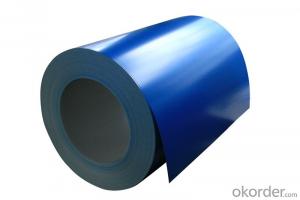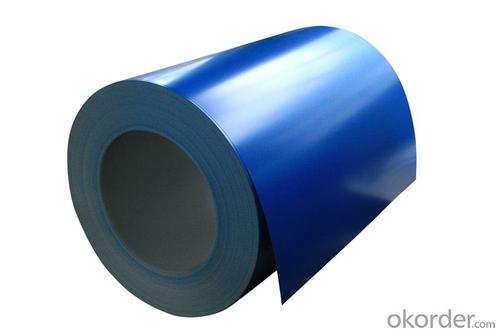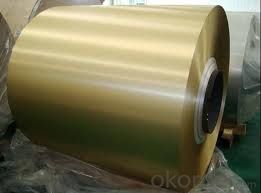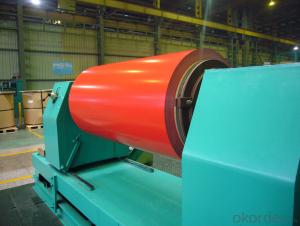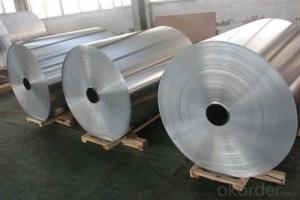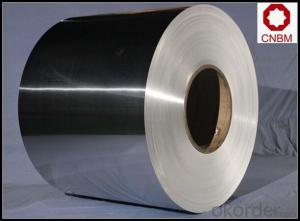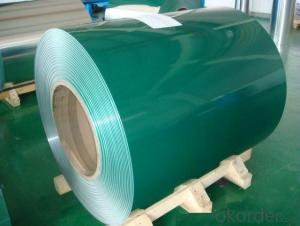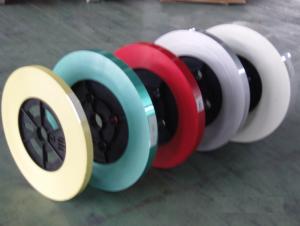PVDF Coated Aluminum Coil for Channel Letter
- Loading Port:
- China Main Port
- Payment Terms:
- TT OR LC
- Min Order Qty:
- -
- Supply Capability:
- -
OKorder Service Pledge
OKorder Financial Service
You Might Also Like
1) Temper: H14, H18, H24 mainly.
2) Alloy 1100, 1050, 3003,3004, 5052, 8011 etc
color coating
1) The type of paint: PVDF
2) Thickness coating: PVDF: More then 25 micron.
3) Paint supplier: PPG (PVDF)
4) Interior diameter: Mainly in 405mm, 505, mm
5) Width: Less then 1600mm, sheets are also available
6) Color: Panton, RAL or refer to customers' counter sample.
7) Coating hardness: (pencil hardness) more than 2H
8) Impact resistance: No cracking and peeling (50kg/cm, ASTMD-2794: 1993)
9) Flexibility (T-bend): No more than 2T
- Q: Explain how the use of aluminum coils impacts the welding speed and efficiency.
- <p>Aluminum coils can significantly affect welding speed and efficiency due to their thermal conductivity and melting point. Aluminum's high thermal conductivity means it dissipates heat quickly, which can slow down the welding process as more energy is required to maintain the necessary heat for fusion. Additionally, aluminum's lower melting point compared to steel can lead to faster melting, potentially increasing welding speed but also requiring more precise control to prevent overheating and defects. The use of aluminum coils can also influence efficiency through the type of welding process used; for example, TIG welding is often preferred for aluminum due to its ability to provide precise heat control, which can enhance both speed and quality of the weld.</p>
- Q: What are the compositions of aluminum coil coating?
- Resin, pigment, auxiliary and solvent.
- Q: Is it possible to determine the spring constant of an aluminum coil using a spring compressor?
- <p>Yes, you can use a spring compressor to measure the spring constant of an aluminum coil. The spring constant (k) can be calculated using Hooke's Law, which states that the force exerted by a spring is proportional to its displacement (F = kx). By applying a known force to the spring and measuring the resulting displacement, you can calculate the spring constant. A spring compressor can apply a controlled force, and a displacement gauge can measure the compression, allowing you to determine the spring constant accurately.</p>
- Q: Can aluminum coils be used for heat dissipation purposes?
- Aluminum coils prove to be highly effective in the dissipation of heat. Due to its exceptional heat conductivity and minimal thermal resistance, aluminum serves as an excellent medium for transferring heat from a source and releasing it into the surrounding environment. Various applications, including refrigeration, air conditioning, radiator systems, and heat exchangers, commonly employ aluminum coils. These coils are designed to optimize the available surface area for heat transfer, thereby ensuring efficient cooling and dissipation. Moreover, aluminum possesses the advantages of being lightweight and resistant to corrosion, making it a practical choice for heat dissipation across diverse industries. Overall, aluminum coils emerge as a dependable and efficient solution for heat dissipation purposes.
- Q: Can aluminum coils be used in the production of beverage cans?
- Yes, aluminum coils can be used in the production of beverage cans. Aluminum coils are commonly used because aluminum is lightweight, corrosion-resistant, and recyclable, making it an ideal material for beverage cans. The coils are typically formed into can bodies and lids, which are then further processed to create the final beverage cans.
- Q: I have a diamond back bike with an aluminum frame. will it rust if i ride or put it in the frame? is it bad for the bike?
- No, but take care of it and it will stay looking good too. I keep mine inside. I clean and maintain it all the time! It's almost like a care, the better you take care of it, the better it will run.
- Q: Can aluminum coils, which are typically used for industrial purposes, be utilized for baking pizza?
- <p>Aluminum coils, commonly used in industrial applications, are not recommended for baking pizza. While aluminum is a good conductor of heat and can be used in baking, aluminum coils are often too thick and not designed for direct contact with food. They may also contain coatings or treatments unsuitable for food. Instead, use aluminum foil or a pizza stone designed for baking to ensure food safety and even heat distribution.</p>
- Q: What are the various dimensions and specifications of aluminum coils available in the market?
- <p>Aluminum coils come in various sizes and specifications to cater to different industrial needs. Common sizes include thicknesses ranging from 0.005 to 0.5 inches (0.13 to 12.7 mm), widths from 1 to 72 inches (25 to 1829 mm), and lengths from 10 to 6000 feet (3 to 1829 meters). The specific dimensions can vary based on the manufacturer and the application, such as construction, automotive, or packaging. It's important to consult with suppliers for the exact sizes available for a particular project or application.</p>
- Q: Can aluminum coils be used in the production of aluminum composite roofs?
- Yes, aluminum coils can be used in the production of aluminum composite roofs. Aluminum coils are commonly used as the raw material for manufacturing aluminum composite roofs due to their lightweight, durability, and resistance to corrosion. The coils are typically processed and shaped into panels that are then used as the outer layer of the composite roof system, providing excellent protection against weather elements and ensuring long-lasting performance.
- Q: Can aluminum coils be used in the production of heat sinks?
- Indeed, the utilization of aluminum coils is applicable in the manufacturing process of heat sinks. Aluminum, owing to its remarkable thermal conductivity and affordability, enjoys widespread usage as a material for heat sinks. These heat sinks are efficiently employed in the dissipation of heat emanated from electronic components like processors, power transistors, and LED lights. The coils can be fabricated into diverse forms and dimensions to fulfill particular heat dissipation prerequisites. Furthermore, aluminum possesses the advantages of being lightweight, resistant to corrosion, and readily accessible, rendering it an optimal selection for the production of heat sinks.
Send your message to us
PVDF Coated Aluminum Coil for Channel Letter
- Loading Port:
- China Main Port
- Payment Terms:
- TT OR LC
- Min Order Qty:
- -
- Supply Capability:
- -
OKorder Service Pledge
OKorder Financial Service
Similar products
Hot products
Hot Searches
Related keywords
